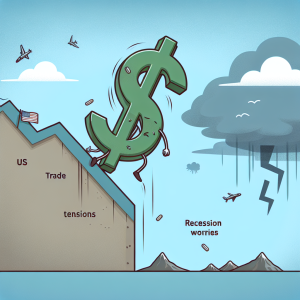As Singapore navigates a complex global economic landscape, Prime Minister Wong has not ruled out the possibility of a recession, emphasizing the need for proactive measures to mitigate potential fallout from rising tariffs. In recent statements, PM Wong outlined the formation of a dedicated task force aimed at addressing these economic challenges, underscoring the government’s commitment to safeguarding the nation’s financial stability.
The economic outlook for Singapore has become increasingly uncertain, particularly in light of ongoing trade tensions and the potential for heightened tariffs that could impact key sectors. The task force, as described by PM Wong, will focus on strategies to bolster economic resilience and support affected industries. This initiative reflects a broader recognition of the interconnectedness of global trade and domestic economic health, as Singapore remains highly reliant on its export-driven economy.
In response to the looming risks, the task force will prioritize collaboration between various stakeholders, including government agencies, industry leaders, and academic institutions. This multi-faceted approach draws inspiration from successful economic task forces in other regions, such as those focusing on infrastructure development and sustainable practices. By integrating diverse perspectives and expertise, Singapore aims to create a robust framework that can adapt to changing economic conditions.
Importance of Sustainable Practices
A critical component of the task force’s mission will be to emphasize sustainable development. As the global economy increasingly shifts towards greener practices, Singapore’s ability to innovate and implement environmentally friendly solutions will be vital. The task force is expected to explore new technologies that not only enhance economic growth but also align with global sustainability goals. This focus on sustainable practices is not just about compliance; it is about positioning Singapore as a leader in the emerging green economy.
Adapting to Global Changes
Moreover, the task force will address the need for a streamlined permitting process for vital projects, ensuring that economic revitalization efforts are not hindered by bureaucratic delays. By fostering a more efficient regulatory environment, Singapore can enhance its attractiveness as a destination for investment, particularly in sectors poised for growth in the face of global shifts. This proactive stance is essential for maintaining Singapore’s competitive edge in the region.
Conclusion
As Singapore faces the possibility of a recession, the establishment of a task force to tackle tariff fallout reflects a strategic response to potential economic challenges. By prioritizing collaboration, sustainable practices, and regulatory efficiency, the government aims to bolster the nation’s resilience in an uncertain global landscape. While the road ahead may be fraught with challenges, Singapore’s commitment to innovation and economic adaptability positions it well to navigate these turbulent times and emerge stronger.





